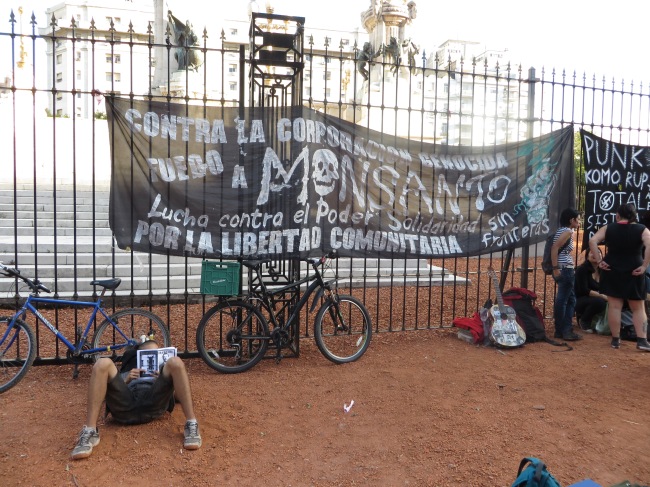In Argentina, the socialist party is the 4th most popular political party. Cristina Kirchner (the President) just became the godmother of a child of two lesbian women. Marches and protests occur daily, and the public university system is free for all and so is the healthcare.
Now whether these facts scare the living daylights out of you or whether you are impressed (or just impartial), let me just say that Argentina is capitalist state. It is a democratic nation in which, people work within the private and public sector. While many aspects of the Argentine government impress me — universal healthcare and access to education — Argentina has many problems of its own. (By contrast, the U.S. works within a capitalist system of education which is antiquated and not working, and clearly talking about healthcare in the U.S .has proven to be exhausting and trite.)
The interesting thing is, a century ago, Argentina was richer than Sweden, France, Austria and Italy. It was far richer than Japan. European immigrants flooded here in search of better opportunities due to a booming agricultural industry (not unlike the goals of many immigrants coming to the US during that time.) Little did they know that the advent of the leader Juan Perón would define the rest of their history up until now. The Peróns were unusually seductive populists. I’m going to skip a lot of the history now mainly because I want to talk about other things but to give you a gist, here is a list of things that happened between Perón’s time in power (1946-1955) and now: nationalism, romanticism, fascism, socialism, backwardness, progressiveness, militarism, mournfulness, irresponsibility, repression, dictatorship, debt, neoliberalism, privatization, redistribution, 2014. Basically, any “ism” you can think of and Argentina has had it. And Peronism is a political philosophy (still around today – the current Pres is a Peronista) that encompasses so much that it has been supported by conservatives, fascists and socialists alike. (Honestly, I don’t know how to define it.) The bottom line is that Peronism has defined the political structure of Argentina and, like most of Latin America, Argentina embraced the Washington consensus in favor of open markets and privatization in the 1990s (which luckily has been changed) but has left the country suspicious of liberal reforms and wary of US assistance.
And well, needless to say, 90% of the country goes to the therapist. Not a lie.
So yes, this country is very political. Politics is not a taboo subject here. It’s amazing how open they are about it. First of all, my host mom, Ana, directly asked me if I was a Democrat, when I said, “yes,” she said, “good.”
Political side note: In a previous post I wrote about Marco Rubio’s claiming that Argentina “is not a democracy.” I now have a response to that claim if I were to defend Argentina to Rubio. Before our trip to Patagonia, we listened to an Argentine winner of the Nobel Peace Prize, Adolfo Pérez Esquivel, describe his views of democracy, human rights and politics in general. What stood out to me most were his views on democracy. Esquivel believes that democracies do not fail, what fail are the policies. Democracy is a space for building. Instead of building spaces for freedom and participation, politicians end up destroying that very thing. I found this very accurate and found this to be an accurate cause for the controversy over what is considered a democracy. But as for me, I still find Argentina to be democratic.
Back to the political nature of this country: The day after we returned from the South, March 24, it was a national holiday, “El Día de Memoria, Verdad, y Justicia” (Day of Memory, Truth, and Justice.) This date marked the anniversary of the coup which introduced the military dictatorship in 1976, and is now an opportunity for political action, social engagement, and remembering the desaparecidos – those who disappeared due to the actions of the military regime. This march was unlike any other march I had ever seen. There were street vendors, barbecue, drums, live music, and “un monton” (a lot) of flags filling the streets. 
This was a whole day affair. Much of the event was dedicated to commemorating and mourning the desaparecidos and other victims of the dictatorship. (I’m going to refer to those who disappeared as desaparecidos, not “disappeared” because one of our lecturers encouraged us to always use the Spanish term since Americans have never experienced any form of forced governmental disappearances, and therefore we don’t have an equivalent word in English.) The desaparecidos were the 30,000 people—activists, intellectuals, artists, writers, workers—who were kidnapped, detained, tortured, and eventually murdered by the government between 1976 and 1983. (I talked about this is a previous post, so I’m going to keep this short.) This terrorism of the state was a government strategy to keep the population subdued and under control.
Argentina today still struggles with how best to move forward. The debate over whether to focus on mourning the losses or celebrating democracy’s survival. And the march definitely reflected this mix. People held posters with the faces and names of those who died, many people chanted and played drums, others spray painted buildings with sayings such as, “Dónde está Jose?” While this was a march dedicated to the desaparecidos, it was not a somber event. It seemed more of an act of solidarity between the Argentine’s, coming together to remember what they’d lost, but able to move on by looking toward the future. (There was even an after-party in the evening with a full-on concert.)
The march stood out to me because not only were there people remembering those they lost, but TONS of political organizations came out to expose their qualms with the current government. There was a group in favor of Cristina Kirchner; there was a group against her; there was a group fighting for women’s rights, Communism, Socialism, the rights of the petroleum workers. You name it and an organization was probably there carrying banners and flags with a swarm of people behind them. This was so interesting to me because in the U.S. on Memorial Day, there may be a parade or a festival or something to commemorate those who died, but no way would there be a public march of political groups accompanying it. Political activism here is so much more accepted and normal. There were police to regulate it a little, but not too many. People were openly spray painting public monuments and no one was stopping them. I came to the conclusion that especially since the military and the police have such a bad connotation here due to the dictatorship, that if they were to stop the people from displaying their opinions (through any form) it would be more detrimental and violent than if they let them be. And it’s true: there was not a single violent event. Each group walked through the streets displaying its opinion in whatever fashion, but nothing got out of hand.
There was even a banner that read, “Democracy or Corporations.” Yep, it says “or.” That is something you would never see in the U.S. The Argentine government actively broadcasts the idea that corporations are a threat to democracy, and this claim is not unwarranted, given that many of the clandestine detention centers were sponsored by corporations, and the economic collapse in 2001 was largely the fault of corrupt government deals with unscrupulous multinationals. In America, corporations are legally considered people. They’re an essential part of the capitalist-democratic system, to the point that no matter how badly they trick us and scheme against us, we still consider them essential. In America, no government official would ever think of challenging democracy against such a symbol of capitalism—at least not so publicly. It’s a pity, America.
To sum it up, the march was by far, the best thing I have witnessed here so far.
Observations:
- Interesting: I saw an antique sign/ad forNestlé’s baby formula that used to be popular in developing countries. This baby formula invention is actually what started the whole bottled water industry (ordeal.) What happened was Nestle was selling baby formula to mothers in these countries who would dilute the formula with water in order to make the supply last longer. But because much of the time, the water they used was not clean, many babies were getting sick. Therefore,Nestlé jumped in selling bottle water to already poor people, exploiting their resources/situation and the rest is history. Hence, why I strongly dislike bottled water… (ehem, water is a human right and should not be bought and sold for profit.)
- More than once have I seen a TV show playing in a public place with deaf subtitles (meaning a person in the corner signing), but no subtitles. Isn’t is hard to watch the show when you’re watching a person sign? I just thought subtitles were just as good for those who are deaf. What do I know?
- On a menu written in English here, they wrote, “smashed potatoes.” Can I start calling them that? Super cute.
- My host mom keeps the radio on all day for the dog. She also sings a lot to herself. I love her.
- Pilopos (cat calls) – on a good day, I can tolerate them; on a bad day, I would love to punch the guy in the face.
- To say trash cans here are proliferate would be a grand exaggeration. They are quite hard to come by. Also, not much recycling.
- Apples here rival New England, and pizza rivals Italy.
- I saw a lady drinking maté while working out in the gym. Classic Argentine.
Sorry this is so long. I’ve been meaning to write these things for a while now.
Ciao!
Emily “smashed potatoes” Kennedy













Nicely done. The Nestlé poster is interesting in that it recalls how corporations can be very resilient when looking to exploit a population. The formula it sold was unnecessary since breast feeding was superior. But once those in poverty were convinced formula was better, the water people used sickened them and led to the advent of bottled water. For Nestlé, it was a win-win.